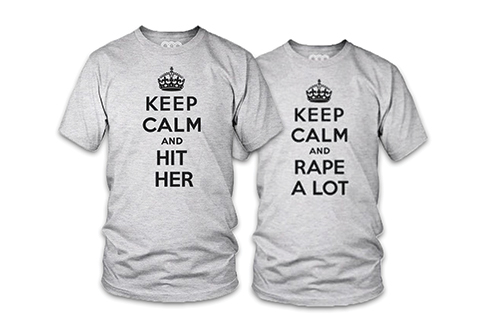Some scary statistics came out of a survey of college-aged men a few years ago that still send chills down my spine. According to Body Wars, a book by Dr. Margo Maine, 30 percent of college men surveyed said they would rape if they knew they’d get away with it.
‘Keep calm’ and don’t rape women

Some scary statistics came out of a survey of college-aged men a few years ago that still send chills down my spine. According to Body Wars, a book by Dr. Margo Maine, 30 percent of college men surveyed said they would rape if they knew they’d get away with it.
That number increased to 58 percent when the wording changed to “force women to have sex.”
Just over 83 percent said that “some women just look like they are asking to be raped.”
Just so we’re on the same page: More than half the men our age outright stated they’d rape someone, and four out of five men blamed women—how they dressed, acted and looked—for sexual assault.
Messed up, right? Right. Agreed.
Why is it, then, that some people thought producing and selling T-shirts that say, among other things, “Keep calm and rape a lot” was a good idea?
Solid Gold Bomb, an Amazon.com retailer, introduced this item to its shop, as well as variations including “choke her,” “knife her,” “grope on” and “hit her.” The president of the company that produced the shirts said he had no idea his store sold shirts that promoted sexual assault, domestic violence and murder.
In fact, he tried to defend himself by stating that the slogans were computer-generated, with no oversight as to what was put up for sale.
Incredibly unlikely. Any program that generates slogans is going to have a list of excluded terms. The company also stated that its list of approved words was just over 700.
Does anyone want to address the fact that “rape,” “hit,” “knife” and “choke” were apparently approved for this “program”? Also, that males aren’t even mentioned in this—not one slogan promoted violence against men.
I don’t buy for a second that the slogans were made by a computer.
And even if they had been, any retailer knows the importance of quality control. Had a computer program truly been used for this purpose, somebody internally would have seen the designs and approved them, and they’d make it into the shop regardless.
Amazon is also partially responsible. Although it removed the listings after a rise in negative media attention, they shouldn’t have been listed in the first place. The retail giant states that it reviews items offered for sale so that it can monitor for restricted products and prohibited content.
Even if this is automated, it’s safe to assume that Amazon would have a filter that catches words and phrases like “rape” or “knife her,” especially after the series of controversies the retailer has faced over the last decade, including the sale of a guide to pedophilia and T-shirts glorifying Nazis.
Apparently, Amazon didn’t think about that.
Chris Brown-esque slogans aside, there’s a deeper problem here. A surprising number of people online attempted to defend the sale of the shirts. Some claimed that pulling the shirts was a violation of free speech, while others asserted that people were getting too wound up over a “joke.”
The people defending the shirts under the guise of “free speech” clearly don’t understand the exclusions in the First Amendment, which includes the extremely relevant “incitement to crime.” In other words, your speech isn’t protected if it advocates criminal acts like rape or murder.
As for those suggesting that people upset by the sale of the shirts shouldn’t get so wound up, I’d like to point out the aforementioned statistics. As bad as the situation is already, the last thing the world needs is people trivializing sexual assault and domestic violence.
In the end, though, there were enough outraged people to send a strong message opposing such statements. Following the massive backlash about the designs, Solid Gold Bomb announced that its sales had dropped to almost nothing, and the president said the company would likely go under as a result.
Rightly so. Rape and domestic violence are already big enough problems without people trying to sell things that promote them.







Nicely put. The fate of this company is justified. They brought this on themselves by not only trivializing rape but by trying to capitalize off of it as well. As far as I’m concerned they deserve to go under. Think about it this way: not only did someone at the company come up with the idea for these shirts, somebody else approved them, no one complained – or complaints were ignored by those in authority – and no one in marketing thought to point out how terrible an idea these shirts were. Good riddance to all of them.